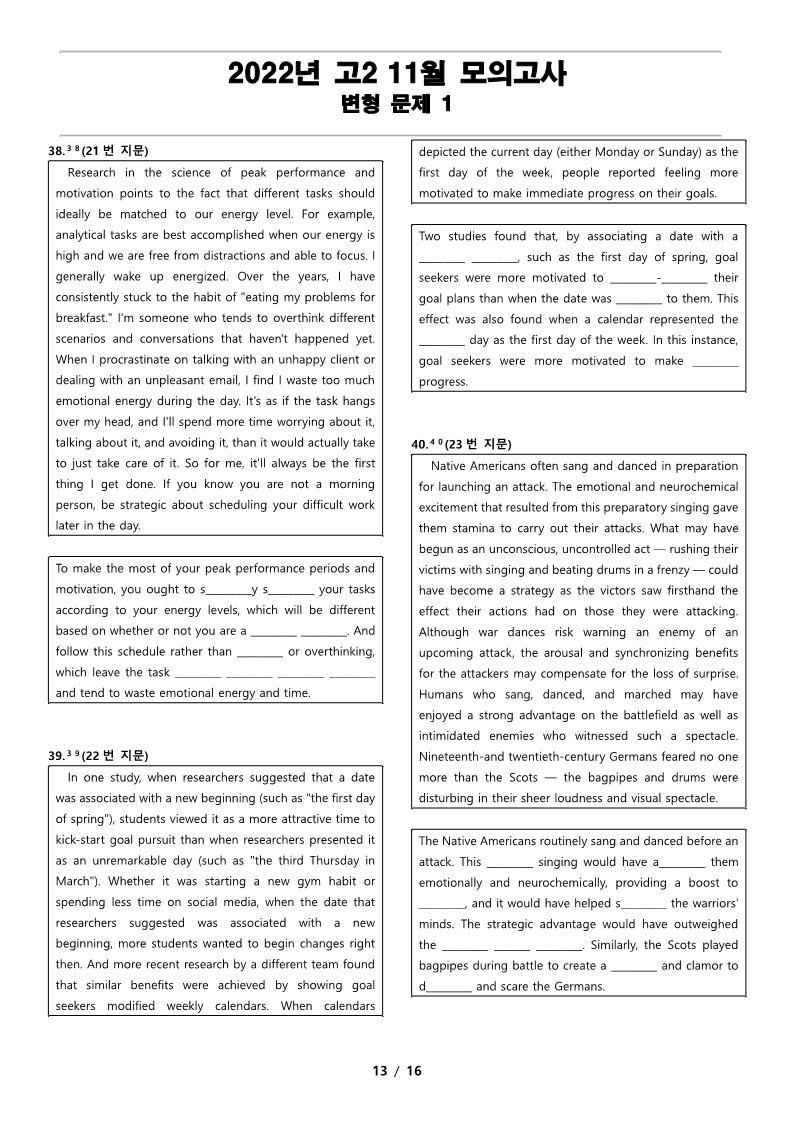2022년 고2 11월 전국 연합 모의고사
변형 문제 1
2022년 고2 11월 전국 연합 모의고사 변형 문제 1
출판사에서 오랫동안 영어 번역과 교정을 하셨던 원어민 선생님과
현직에서 강사를 하고 있는 연구진들이 학생들을 위한 최상의
2022년 고2 11월 전국 연합 모의고사 변형 문제 1 을 선보입니다.
사고력과 이해력을 요구하는 문제들로 내신 대비 뿐만이 아니라
수능도 한꺼번에 공부하실 수 있는 자료입니다.
중간고사&기말고사 전에 더메이킹스(The Makings)에서 제작한
2022년 고2 11월 전국 연합 모의고사 변형 문제로 마무리 하세요.
정답 확인 하러 가기!
2022년 고2 11월 전국 연합 모의고사 변형 문제 1
2022년 고2 9월 전국 연합 모의고사 변형 문제, 내신대비, 영어내신자료,고등영어자료, 모의고사 변형문제,전국 연합모의고사 변형자료, 모의고사 영어 서술형 대비, 대치동 고등 영어자료, 대치
themakings.co.kr
themakings.co.kr
The Makings의 2022년 고2 11월 전국 연합 모의고사 변형 문제는
총 11개의 유형으로 구성되어 있습니다.
1. 빈칸 채우기(객관식)
2. 글의 내용 일치/불일치(객관식/한글 선택지)
3. 글의 내용 일치/불일치(객관식/영어 선택지)
4. 글 끼어 넣기(객관식)
5. 어법(서술형)
6. 어휘(서술형)
7. 주제문(객관식/영어 선택지)
8. 어휘 빈칸 채우기(서술형)
9. 영작(서술형)
10. 요약문 완성하기(서술형)
11. 문단 재배열 하기(객관식)
더메이킹스(The Makings)가 제작한 2022년 고2
11월 전국 연합 모의고사 변형 문제 1의 지문입니다.
1번 지문(문항 번호 20번)
Clarity in an organization keeps everyone working in one accord and energizes key leadership components like trust and transparency. No matter who or what is being assessed in your organization, what they are being assessed on must be clear and the people must be aware of it. If individuals in your organization are assessed without knowing what they are being assessed on, it can cause mistrust and move your organization away from clarity. For your organization to be productive, cohesive, and successful, trust is essential. Failure to have trust in your organization will have a negative effect on the results of any assessment. It will also significantly hinder the growth of your organization. To conduct accurate assessments, trust is a must - which comes through clarity. In turn, assessments help you see clearer, which then empowers your organization to reach optimal success.
2번 지문(문항 번호 21번)
Research in the science of peak performance and motivation points to the fact that different tasks should ideally be matched to our energy level. For example, analytical tasks are best accomplished when our energy is high and we are free from distractions and able to focus. I generally wake up energized. Over the years, I have consistently stuck to the habit of "eating my problems for breakfast." I'm someone who tends to overthink different scenarios and conversations that haven't happened yet. When I procrastinate on talking with an unhappy client or dealing with an unpleasant email, I find I waste too much emotional energy during the day. It's as if the task hangs over my head, and I'll spend more time worrying about it, talking about it, and avoiding it, than it would actually take to just take care of it. So for me, it'll always be the first thing I get done. If you know you are not a morning person, be strategic about scheduling your difficult work later in the day.
3번 지문(문항 번호 22번)
In one study, when researchers suggested that a date was associated with a new beginning (such as "the first day of spring"), students viewed it as a more attractive time to kick-start goal pursuit than when researchers presented it as an unremarkable day (such as "the third Thursday in March"). Whether it was starting a new gym habit or spending less time on social media, when the date that researchers suggested was associated with a new beginning, more students wanted to begin changes right then. And more recent research by a different team found that similar benefits were achieved by showing goal seekers modified weekly calendars. When calendars depicted the current day (either Monday or Sunday) as the first day of the week, people reported feeling more motivated to make immediate progress on their goals.
4번 지문(문항 번호 23번)
Native Americans often sang and danced in preparation for launching an attack. The emotional and neurochemical excitement that resulted from this preparatory singing gave them stamina to carry out their attacks. What may have begun as an unconscious, uncontrolled act ― rushing their victims with singing and beating drums in a frenzy ― could have become a strategy as the victors saw firsthand the effect their actions had on those they were attacking. Although war dances risk warning an enemy of an upcoming attack, the arousal and synchronizing benefits for the attackers may compensate for the loss of surprise. Humans who sang, danced, and marched may have enjoyed a strong advantage on the battlefield as well as intimidated enemies who witnessed such a spectacle. Nineteenth-and twentieth-century Germans feared no one more than the Scots ― the bagpipes and drums were disturbing in their sheer loudness and visual spectacle.
'전국 연합 모의고사 변형 문제 > 고2 모의고사 변형 문제' 카테고리의 다른 글
| 2022년 고2 11월 전국 연합 모의고사 변형 문제 3 (0) | 2022.12.04 |
|---|---|
| 2022년 고2 11월 전국 연합 모의고사 변형 문제 2 (0) | 2022.12.03 |
| 2022년 고 2 6월 전국 연합 모의고사 변형 문제 4 (0) | 2022.10.12 |
| 2022년 고 2 6월 전국 연합 모의고사 변형 문제 3 (0) | 2022.10.09 |
| 2022년 고2 9월 전국 연합 모의고사 변형 문제 4 (0) | 2022.09.20 |

